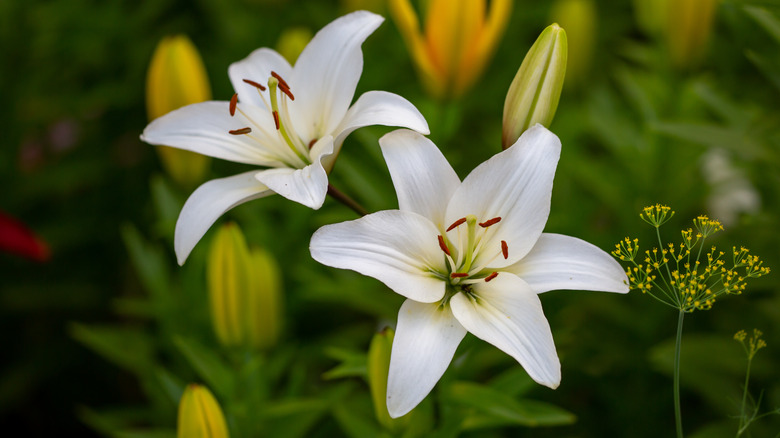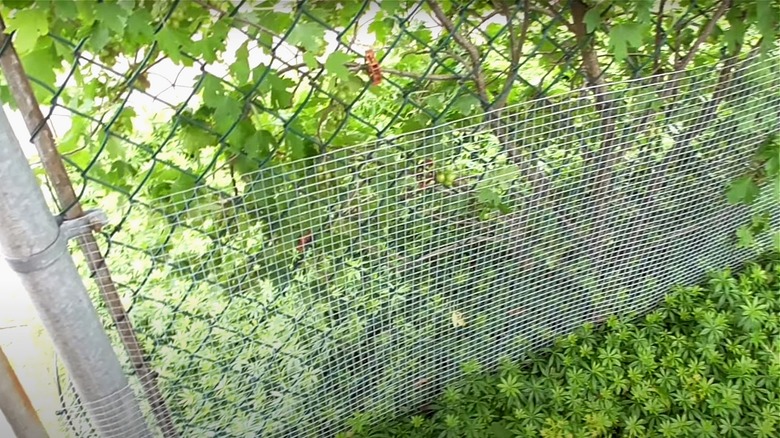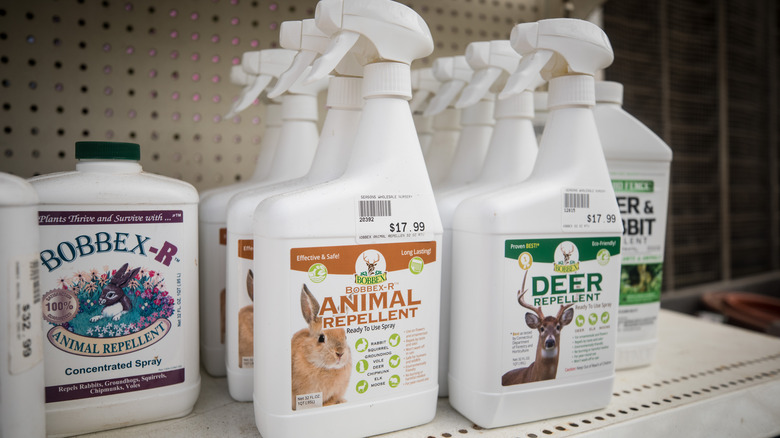The Best Ways To Keep Your Lilies Safe From Hungry Rabbits
A rabbit's innocent "it wasn't me" stare may make you melt, but the sight of decimated lily bulbs in your garden won't. Although grown to create a pollinator paradise, lilies (Lilium) attract rabbits, too. This isn't surprising, considering the furry pests' penchant for browsing and chewing through just about anything that grows in your yard. However, they especially like the flowers' young plants. Preventing your lilies from becoming salad bowls in the most fool-hardy way is to fence them in with chicken wire. But if you don't have too many plant rows and find the fencing costs unviable, natural and commercial repellent sprays are another option. The downside is that they'll need reapplications and regular switch-ups to remain effective. You can also tidy up your property to oust them from their favorite shelter spots.
The trouble with repelling rabbits is that once they're habitual to munching your showy blossoms, there's no holding them back. So, take preventative measures the moment their damage to your lilies becomes apparent. As their incisors are razor-sharp, bunnies cleanly cut the flowerheads at a slanted, 45-degree angle, in contrast to the jagged cuts made by deer. Their short stature limits their damage to under 2 feet — unless the snow blanket gives them a leg up. Finding a cluster of five to ten ⅜-inch wide, tan spherical pellets is another tell-tale sign. Hard soils may sometimes register their four-toed paws, with the back prints being 2.5 times larger than the ones on the front.
Prop fences around your lilies
Constructing a stake-supported, wire-based fence is the best way to protect your lilies from hungry critters. Favor the ones with under 1-inch mesh sizes because they keep the younglings out, too. Push the fence at least 6 inches deep into the ground and flatten out a few inches toward the rabbits' entry. Alternatively, lay a layer of rocks and bricks around the fence to prevent the pests from accessing the flowers by digging underneath. Ensure the structure is at least 2 feet high, but raise it further if your area receives snow or has jumping hares.
If you're only looking for a short seasonal fix (for instance, if you just wanted to give the blooms extra protection in the summer), electrical netting may be more suitable. Although easy to install and use, they need regular maintenance or the twitchy-nosed creatures could chew through the fencing. To avoid such possibilities, double-wrap up to 3 feet of the fence's bottom with chicken wire. Use posts wherever necessary to prevent the wire from dropping down. You can also repurpose old plastic milk containers to protect individual lilies. Remove the bottom of a 1-gallon box, place it around the blooms after leaving some margin, and drive it 3 inches deep into the substrate. Covering your plants with nylon mesh or another garden cover can also yield great results.
Make the area uninviting
While fences are great at banishing rabbits, they're unsightly, expensive, and must be monitored regularly for breaches and half-chewed wires. If you find it a bother, use the critters' noses against them by wielding scents that they dislike and that also mask the pleasant aroma of the lilies. Blood meal — the powdered blood collected from slaughterhouses — can offend the bunnies' herbivorous sentiments. Just spread it thinly alongside your lilies, spray a diluted mixture, or add it to a container and place the vessel adjoining the potted blooms. To boot, it doubles up as a nitrogen fertilizer, which lilies need when their leaves are growing. Apply it around dusk or dawn, when the toothed bandits are most active. Reapply after rain and sprinkler irrigation.
However, avoid blood meal if coyotes are a festering problem, as they find it attractive; use egg-based repellents like Bobbex instead. If you're game for a DIY recipe, Seattle Neighborhood's Gardening Program has one involving eggs, yogurt, cayenne pepper, dish soap, and essential oils. You can also keep hungry rabbits out with the common household essential talcum powder. Rabbits find it unpleasant, but dusting your plants with baby powder has its drawbacks. Being lightweight, it can't withstand strong winds and leaches out if it rains, necessitating frequent reapplications. That being said, clear out weeds, debris, rock piles, and other safe hiding spots from your garden to prevent rabbits from establishing their "bolt areas" closer to your lilies.


